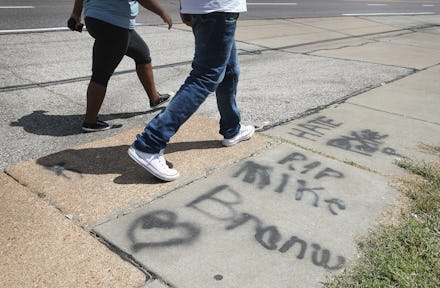The new Michael Brown video won't tell us anything we didn't already know

From the moment Michael Brown's body hit the pavement on Canfield Drive, after the unarmed black teen was shot by a white police officer in Ferguson, Missouri, in 2014, local law enforcement devised a plan to vilify him and paint him as unsympathetic. That was evident after a former Ferguson police chief released surveillance footage of Brown allegedly committing strong armed robbery of a convenience store in the hours that preceded his confrontation with Darren Wilson, the Ferguson officer who was ultimately cleared of any wrongdoing in the teen's death.
Stranger Fruit, a new documentary about Brown's case that shows previously unreleased security footage, casts more doubts about the police's narrative. The documentary contains footage the film's director, Jason Pollock, says shows Brown arranged an exchange of marijuana for cigarillos with other store clerks, hours before he returned to the market to collect the merchandise.
But the video — and likely the documentary — won't change a widely held belief among Black Lives Matter movement activists. As law enforcement officials and media outlets have done in other prominent cases involving black victims of police or vigilante violence, activists said they believe police deliberately sought to tarnish the slain teen's name ahead of a grand jury decision not to charge Wilson with any crime. Police released video in 2014 showing a man they identified as Brown shoving a convenience store owner and exiting the store with cigarillos that he allegedly hadn't paid for.
"They destroyed Michael's character with the tape, and they didn't show us what actually happened," Pollock, the documentarian who obtained the footage from St. Louis County police, said in a New York Times interview.
A lawyer for the owner of Ferguson Market and Liquor Store had denied any such exchange or arrangement was made between Brown and store clerks, the Times reported. But Pollock said the withholding of surveillance injects reasonable suspicion about police motives in the case.
"This shows their intention to make him look bad. And shows suppression of evidence," he said in the Times interview.
On Monday, St. Louis County prosecutor Bob McCulloch all but called Pollock's assertions "stupid." In a news conference, McCulloch, who presented Brown's case to the grand jury that declined to charge Wilson in November 2014, said the Stranger Fruit documentary is "very poorly edited" and is a "pretty pathetic attempt" to cast doubts about his handling of the case.
"It was determined that [the video] was neither relevant nor material to anything that occurred ... on Canfield Drive," the prosecutor said in the news conference.
In 2014, activists' view of how poorly police handled the case helped sparked peaceful protests and civil unrest around the nation. And the documentary, which debuted at the SXSW festival in Austin, Texas, on Saturday, brought about new protests outside of the convenience store in Ferguson.
But perhaps the documentarian's revelation shouldn't shock anyone in Ferguson or elsewhere. The families of black victims of police and vigilante violence have historically had to confront police-driven and media-perpetuated narratives that paint their loved ones as innately criminal or deserving of their fate. When 14-year-old Emmett Till allegedly whistled suggestively at a white woman in Mississippi in 1955, allegations which were recently revealed to be fabricated, the prosecutor suggested that the teen's supposed actions were immoral but not cause for his lynching by the woman's husband and brother-in-law.
Of course, there are plenty of recent examples of willful criminalization of black victims of violence. Before charges could be filed in the 2012 Trayvon Martin shooting case, George Zimmerman sullied the unarmed teen's name in cable news interviews, while media found unflattering social media posts and reported that Martin had been suspended from his Miami area school. The 17-year-old had walked to a convenience store near a Sanford, Florida, gated community for a snack.
Officials investigating the 2014 Cleveland police shooting of Tamir Rice said officers believed they were responding to reports of an adult black male wielding a gun in a park — not the 12-year-old playing by himself with a toy gun. Timothy Loehmann, the officer who shot Rice, acted within a split second, without a reasonable warning, and was cleared of wrongdoing. In a press conference, Timothy McGinty, the now-former Cuyahoga County prosecutor, seemed to blame Rice for his fate.
Judging by his mother's involvement in the Stranger Fruit film, it's likely the Brown family is grateful for any opportunity to correct the record. But the presumption of innocence for black victims appears to remain a privilege reserved for the non-blacks who kill them.